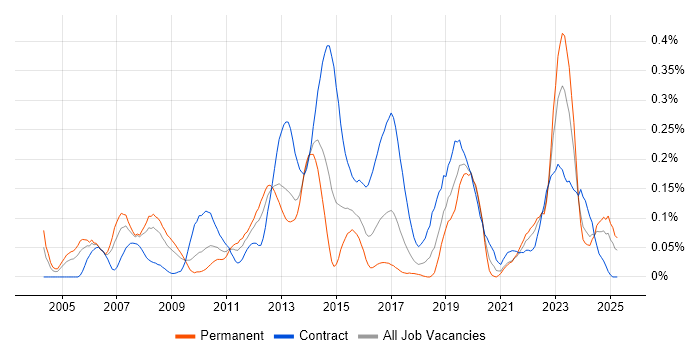Reference Data
England > South West
The table below looks at the prevalence of the term Reference Data in permanent job vacancies in the South West. Included is a benchmarking guide to the salaries offered in vacancies that cited Reference Data over the 6 months leading up to 29 May 2025, comparing them to the same period in the previous two years.
| 6 months to 29 May 2025 |
Same period 2024 | Same period 2023 | |
|---|---|---|---|
| Rank | 178 | 294 | 245 |
| Rank change year-on-year | +116 | -49 | +64 |
| Permanent jobs citing Reference Data | 6 | 7 | 30 |
| As % of all permanent jobs advertised in the South West | 0.17% | 0.072% | 0.45% |
| As % of the Miscellaneous category | 0.54% | 0.24% | 1.11% |
| Number of salaries quoted | 3 | 4 | 28 |
| 10th Percentile | - | - | - |
| 25th Percentile | £47,231 | £36,825 | £58,664 |
| Median annual salary (50th Percentile) | £48,507 | £50,662 | £69,447 |
| Median % change year-on-year | -4.25% | -27.05% | +6.84% |
| 75th Percentile | £56,485 | £66,887 | £77,715 |
| 90th Percentile | £60,506 | - | £86,794 |
| England median annual salary | £72,500 | £86,000 | £70,000 |
| % change year-on-year | -15.70% | +22.86% | -15.15% |
All Generic Skills
South West
Reference Data falls under the General and Transferable Skills category. For comparison with the information above, the following table provides summary statistics for all permanent job vacancies requiring generic IT skills in the South West.
| Permanent vacancies with a requirement for generic IT skills | 1,117 | 2,918 | 2,711 |
| As % of all permanent jobs advertised in the South West | 32.07% | 30.04% | 40.35% |
| Number of salaries quoted | 561 | 2,039 | 1,376 |
| 10th Percentile | £27,500 | £27,989 | £28,500 |
| 25th Percentile | £32,000 | £36,250 | £38,050 |
| Median annual salary (50th Percentile) | £51,000 | £50,000 | £54,882 |
| Median % change year-on-year | +2.00% | -8.90% | +4.54% |
| 75th Percentile | £68,525 | £66,137 | £70,000 |
| 90th Percentile | £80,000 | £82,500 | £86,250 |
| England median annual salary | £60,000 | £55,000 | £65,000 |
| % change year-on-year | +9.09% | -15.38% | +4.00% |
Reference Data
Job Vacancy Trend in the South West
Job postings citing Reference Data as a proportion of all IT jobs advertised in the South West.

Reference Data
Salary Trend in the South West
3-month moving average salary quoted in jobs citing Reference Data in the South West.
Reference Data
Job Locations in the South West
The table below looks at the demand and provides a guide to the median salaries quoted in IT jobs citing Reference Data within the South West region over the 6 months to 29 May 2025. The 'Rank Change' column provides an indication of the change in demand within each location based on the same 6 month period last year.
| Location | Rank Change on Same Period Last Year |
Matching Permanent IT Job Ads |
Median Salary Past 6 Months |
Median Salary % Change on Same Period Last Year |
Live Jobs |
|---|---|---|---|---|---|
| Bristol | +65 | 5 | £48,507 | -23.94% | 1 |
| Dorset | +43 | 1 | - | - | 1 |
| Reference Data England |
|||||
Reference Data
Co-occurring Skills and Capabilities in the South West by Category
The follow tables expand on the table above by listing co-occurrences grouped by category. The same employment type, locality and period is covered with up to 20 co-occurrences shown in each of the following categories:
|
|
||||||||||||||||||||||||||||||||||||||||||||||||||||||||||||||||||||||||||||||
|
|
||||||||||||||||||||||||||||||||||||||||||||||||||||||||||||||||||||||||||||||
|
|
||||||||||||||||||||||||||||||||||||||||||||||||||||||||||||||||||||||||||||||
|
|
||||||||||||||||||||||||||||||||||||||||||||||||||||||||||||||||||||||||||||||
|
|
||||||||||||||||||||||||||||||||||||||||||||||||||||||||||||||||||||||||||||||
|
|
||||||||||||||||||||||||||||||||||||||||||||||||||||||||||||||||||||||||||||||
